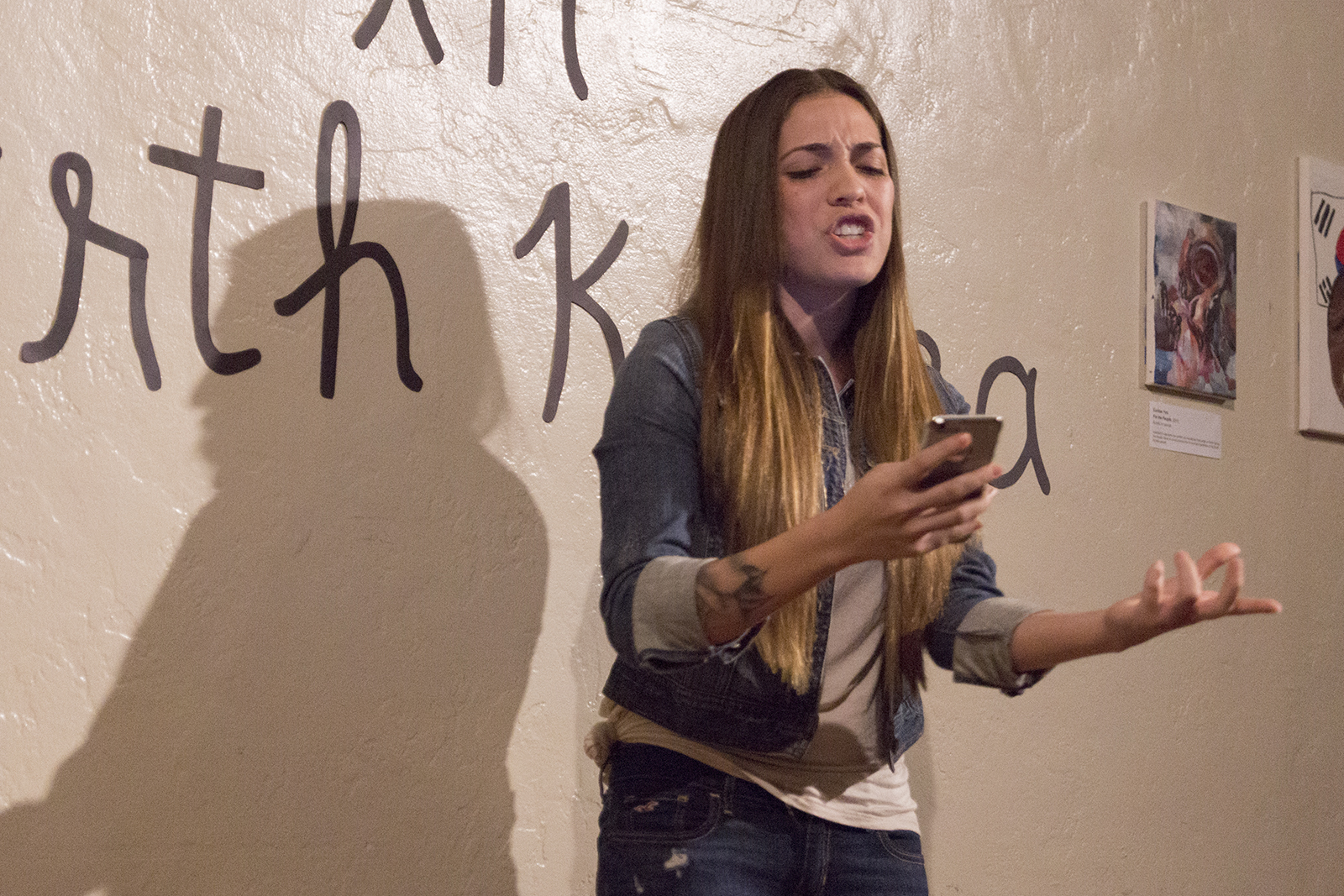LGBTQ Awareness Week organizers aim to make events more inclusive

Alyssa Griego, a fourth-year history student, performs a poem she wrote as part of an LGBTQ Awareness Week event. (Tamaryn Kong/Daily Bruin)
By Alejandra Reyes-Velarde
April 17, 2015 10:14 a.m.
After coming out as a lesbian to her family at 13 years old, Jennifer Deng found herself in and out of rehab for self-harm, depression and anxiety.
She said she felt that her family tried to slip her sexual identity under the rug, making her feel like she lacked a support system.
Deng, a first-year psychobiology student, said she thinks her family has become closer to her over the years, however, and they are now more understanding of the lesbian, gay, bisexual, transgender and questioning community. After she was taken into inpatient care as a teenager, she said her family members started to realize how harmful their lack of support was to her mental health.
Deng said her experience encouraged her to participate in LGBTQ awareness events this week and educate allies to better support the community.
The organizers of LGBTQ Awareness Week have tried to change it over the past year to make it more inclusive, said Neha Vasudeva, a second-year global studies student and director of LGBTQ Awareness Week.
The Undergraduate Students Association Council Internal Vice President’s office puts on the annual series with help from other campus groups, such as the Queer Alliance at UCLA and the LGBT Campus Resource Center.
LGBTQ Awareness Week was previously called “Ally Week,” but some students said they thought the events and name were not sufficiently representative of the LGBTQ community. Organizers changed the name this year in response to student concerns and tried to increase outreach efforts to different campus communities, Vasudeva said.
“’Ally Week’ made being an ally seem too much like an identity label rather than a commitment to getting out there and actively supporting the community,” said Nami Hatfield, a graduate student at the Graduate School of Education and Information Studies who participated in the week’s events.
Hatfield, who is a transgender woman, was also the representative for the student group TransUP in the Questions for Queers event on Wednesday, a question-and-answer panel organized by OUT@Anderson, the UCLA Anderson School of Management’s LGBTQ club. The panel touched on subjects including campus climate for the LGBT community and what allies can do to support the community.
Hatfield said she has faced direct and indirect aggressions at UCLA for being transgender, such as people laughing behind her back, insulting her or avoiding her. She said she thinks it is important to put herself in the spotlight to educate people about her experience as a transgender student on a college campus.
“This is not really for me, so much as it’s for other people. People are now starting to speak up, which is the first step to changing anything,” she said.
Her involvement in the Questions for Queers panel and other events in LGBTQ Awareness Week are part of Hatfield’s vow to make UCLA a better place for transgender people, she said. Though she said she thinks the campus’s acceptance and awareness of transgender students falls behind that of the gay and lesbian community, Hatfield has noticed more conversations about the transgender community in the last two years. UCLA has started negotiations to change policies such as preferred names on BruinCards to better accommodate the needs of the transgender community at UCLA.
Other events incorporated into LGBTQ Awareness Week included collaborations with the USAC Cultural Affairs Commission for an LGBTQ-themed The Word on Wednesday event, a vigil on Friday in Bruin Plaza and participation in the national Day of Silence.
At The Word on Wednesday event, students performed poetry about the difficulties of coming out to family, supporting friends considering suicide and love stories. The emotional performances provoked both waves of laughter and moments of silence from the audience. In between performances, the hosts read the audience’s responses to questions like “Do you think the word ‘queer’ is empowering?” to educate the audience about the community.
“Being an ally is not just about gender and sexuality and it is not exclusive to any community,” Deng said. “It’s about the experiences that shape and share our identities and giving empathy to how people identify, whether it’s sexuality or gender-related.”
Though the name and focus of LGBTQ Awareness Week may change annually based on each director’s decisions, Vasudeva said she wants to issue an anonymous survey for the groups she has collaborated with about what they think will work best in coming years.


